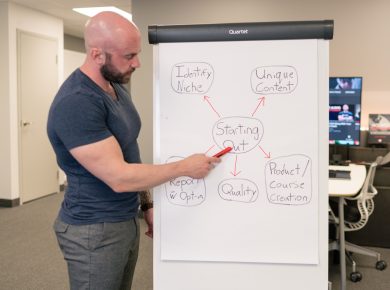If you aren’t properly monitoring your finances, this article might just be the next big thing that’s going to move you that much closer to creating real freedom in your life.
When I was in high school and college, I had absolutely no concept of financial management, financial planning, creating a budget, or any of that stuff.
I kind of just earned money… and then spent money… and hoped at the end of the day that it would work out in my favor.
It normally didn’t, and by normally I mean never.
After this, I “evolved” into trying to be more disciplined with my money.
I tried to spend less then I made each month and figured:
“So long as I end up in the positive numbers each month, then it doesn’t matter how I got there. I’m still doing the right thing and winning the battle at the end of the day.”
Although this is a strategy better than most have, it’s still by NO MEANS an optimal approach towards money management and creating massive levels of success.
It was the right step for me at the time because I needed to learn some discipline, but I wanted more – a lot more.
My serial entrepreneurship had me operating multiple businesses at the same time, but my finances still felt out of control and under-optimized.
So, I started reading everything I could online to change my habits around and I even signed up for 3 different money management courses where I learned a ton about what it takes to “feel in control” of my finances.
Don’t Budget!
When I learn new things and put them into action within my life or businesses, I almost always put my own twist on them to match exactly what I need so that I’m truly creating something for me and no just following a recipe guide.
One thing I ran into time and time again when learning about money management is how prevalent the scarcity mindset is.
Meaning, the word “budget” to pretty much everybody means “never spend money” – well, let me tell you something.
You have to pay to play.
You’re never going to grow a business living your life in a mindset of thinking small. The budget-mindset doesn’t work because:
- They force people to think small.
- You can’t predict the market trends within the confines of a budget.
- The answer to making more money is never found in spending less.
Ask any legendary NFL coach what is more important – offense or defense. They will say offense ten times out of ten because you can never defend your team to victory.
Defense doesn’t get you points, offense does. You want to be in a frame of mind where you are scoring so many touchdowns that your defense doesn’t have to be the main priority.
Am I saying that defense/budgeting isn’t important?
No, of course not.
But I am saying that you can get so caught up on “looking for deals” that you forget that’s not how you build a business.
Do you really think the penny-pinchers are running the show?
Or do you think that they get completely swallowed whole by their competitors who are spending so much money on paid advertising that nobody ever even hears about the penny-pinchers?
That’s what I thought.
If you want to get paid, you’re going to have to pay. Period.
This is why I like the term “financial plan” so much more than “budget”
Budget is associated with going to the dollar store, whereas financial plan is a path you create in order to become more successful the right way.
With that rant out of the way, let’s start piecing together what your financial plan should look like.
Tip #1: Decide A Start Date
This may sound obvious, but the hardest part of making any change in your life is overcoming the initial inertia – picking a start date and preparing and committing yourself to make it happen on that day is a HUGE step towards victory.
If you are reading this article, it’s likely you’re ready to start ASAP.
If you’re anything like me, at one point you were just “done” with not being on top of this – if this sounds like you, then congratulations!
Making the decision to change is the hardest part. Now let’s make that happen with the rest of the tips.
Tip #2: Knowing Is Half the Battle
Everybody has heard the phrase knowledge is power. In this world, you need to know:
- How much you have.
- How much you make.
- How much you owe.
- What your net-worth is.
Knowing how much you have comes down to having a look at your savings accounts, chequing accounts, investment accounts, or any other financial holding areas you may have – then calculating how much you have in each account, what the interest rates are, and what expenses each of them incur. Make note of all of this information because you will need it later.
Knowing how much you make is a lot easier for some people than it is for others. Those on salary can just calculate their monthly income + yearly bonus if applicable.
For hourly workers or for those of you who may work in a business where income can rise and fall unpredictably, this can be a lot more complicated. But, the most important thing for you to do is to is to determine your average monthly income across the year.
If this is lost on you, take a look at your last 6-12 months of income and do the math from there, and if you want to be super conservative, use the lowest income month you had as this will provide you a “worst case scenario” income to work with so there are no surprises.
Knowing how much you owe means determining all of your monthly debt payments, this should be fairly simple to do, and if you have a lot of debt, gathering all of this information is the best thing you can do right now to start creating a financial plan for the future.
To get started here, calculate the total amount you owe each month as well as the minimum monthly payment. Think about things like car loans, mortgages, credit cards, student loans, and anything else you pay on a monthly basis.
Now you’re ready to determine your net-worth – this is that cool number the media always uses to identify how much your favorite celebrity or favorite businessmen are worth.
This is a very easy calculation to do once you have all of the above information in check. Just subtract what you owe from what you have, and you will get your number. It’s as easy as that.
If you’re like most people who are just starting out, this will be an ego-correcting exercise as you will likely have a negative net worth. It really puts things into perspective, I know it did for me.
Tip #3: Determine Your Variable Expenses
I place this tip separate from Tip #2 as the previous revenue/expenses are largely fixed, whereas this area can change on a monthly basis for a large variety of reasons.
Do a big brain-dump here and write down everything you spend money on each month:
- Groceries
- Gas
- All of your utility bills
- Entertainment
- Subscriptions
- Continuing education
Having a look at your bank statements and credit card statements is a great place to start.
Once you have calculated a monthly average, I highly recommend putting all of these expenses into separate categories.
Once you do, you will see how much you are spending in each area of your life, and therefore you will see:
- What you value most (i.e. if you’re spending more on fast food than continuing education you have a problem)
- What you could cut back on
This part of the process is normally the most eye-opening for people because you never really see how much things add up to at the end of the month until you do the math.
Eating out is usually the worst offender here and my clients have saved ridiculous amounts of money learning to meal prep themselves.
Tip #4: Get All of This into A Database
Ditch the old school pen and paper method and get yourself a spreadsheet software. I don’t care which one it is, just find one that you are comfortable with.
You’re going to need this information all organized for many years to come for both tax purposes and to ensure you create real success in your life – so if this part of the process is something you struggle with, get over it or hire someone to do it.
This is something that needs to get done. Period.
After entering all of the above information into your database, you’re going to easily be able to see your Bottom Line. This number will give you a no-nonsense answer whether or not you are overspending or underspending.
For most people, if this is the first time that you’re ever making a financial plan you will be able to determine exactly what adjustments you need to make to your variable expenses in order to start paying off your debts and start growing your company.
Tip #5: Set Your Goals
Congratulations!
You now know more about your current financial situation then anyone else you know.
With this power, you can start setting goals that are much more realistic and productive towards your future success.
When I first did this, I kept it simple. I set short-term goals and long-terms goals.
Short-term goals are your goals that will take you less than a year to achieve. Think about things like paying off your credit card or paying “X” amount off of your student loan.
Long-term goals are your goals that may take many years to accomplish. Think about things such as retirement or paying for your kid’s college tuition.
Setting goals allows you to identify your priorities in life, meaning, it’s a lot easier to cut back on your cellphone data bill when you know your short-term goal is to pay off your credit card.
Tip #6: Design a Financial Plan and Adjust as Necessary
Use your gathered information on your variable and fixed expenses to get a sense on what you know you will spend in the coming months.
With your fixed expenses, you can predict with a high degree of accuracy how much you’ll need to budget for.
With your variable expenses, I recommend using your past spending habits as a way to predict the future spending habits.
If you are looking at your expenses and you’re panicking because you are spending way too much, you might need to make some necessary adjustments.
One way to make it a little easier of a thought process is to divide your expenses up into categories of “want” and “need”.
If you drive to work everyday, your gas expense is a need.
If you enjoy your playlist from a $15/month music subscription service, this would be a want.
The difference between want’s and need’s make the decision-making process much easier when creating your plan from a logical perspective and should be your first area of investigation when looking to cut back on expenses in order to create a better future.
Can you skip movie night in favor of a movie at home?
Can you try a new recipe instead of keep going back to that expensive restaurant?
Do you really need to buy lunch everyday?
How about that subscription that you say you like that you haven’t used in months?
Do you really need that 12th pair of shoes or your 5th purse?
I’m not trying to be captain no-fun here, but there’s normally adjustments that we can make that are fairly obvious from the outside looking in.
Have a look at:
- How much you have
- How much you make
- How much you owe
- How much you’re worth
- What your fixed expenses are
- What your variable expenses are
- What your battle between want vs. need is
- What your goals are
This information will essentially write the plan for you, and don’t overestimate the small stuff. Small savings add up to a lot of money, you would be amazed at how much extra income you can keep just by making one small adjustment at a time.
Tip #7: Check Back In…Often.
Whatever you focus on in life will always expand.
Focus on negativity? You will be a negative person.
Focus on your health? You will become a healthier person.
Focus on your work? You will get more done.
Focus on your finances? They will begin to multiply.
It’s very important to continuously check-in with yourself as your financial situation will likely change fairly often, especially if you’re a start-up entrepreneur.
You may have got a raise, your company may be doing better, or you may have bought a new house which changed a ton of your fixed expenses.
It doesn’t matter what it is, because if you keep checking in on your financial plan you will be able to make the necessary adjustments.
I recommend doing a quick check-in a minimum of once per quarter in order to stay on top of everything. But ideally, this is something you would do monthly – especially for the first couple years of financial planning.
Not only will you be able to stay on top of everything, but you will be able to set new short and long-term goals as well.
I also found that with regular check-ins that I was able to tweak it as necessary. For example, I might have a trip coming up that I now need to factor in, or, I may have discovered I need to cut back more in some areas but increase spending in others.
These check-ins guarantee that as your life changes, your logical financial planning does as well.
Final Thoughts and Five More Bonus Tips
If you have never created a financial plan, now is the time to create one. By following my above process, you will be well on your way to creating financial freedom in your life and building wealth for you and your family.
I’m going to finish off with some random but very helpful tips that I found very helpful in my journey that you can use if it fits your current situation.
But in any case, I highly recommend that you follow all of the above advice I have offered you and act on it immediately, it’s something I really wish I did several years before I actually did it.
Bonus Tip #1: One thing I do to this day is save 20% of all income that comes my way. It is put aside in a savings account that I never check, but I have immediate access to if I want it.
I don’t call it anything, but it can serve as a “rainy day” fund or a fund I can dip into at anytime should I need something to drive the business forward.
It gives me reassurance, and I love having it in place.
I recommend you do this as well as it really helps build financial discipline and give you peace of mind should you ever need it.
Bonus Tip #2: A lot of people like to talk a big game about putting a lot of money into investments, but I don’t ever recommend doing that until you have made the necessary investments in yourself first.
You are the one who has to drive the business forward, so you should be investing in your continuing education and in your business in order to make that happen.
Put another way – if you have six figures building up in index funds but your website looks like crap and you haven’t attended a seminar in years, then your priorities are messed up. Remember what I said in the beginning, you will never grow thinking small.
Bonus Tip #3: If you work on commission, your financial plan is going to be more variable in structure. I recommend you be more aggressive with your saving strategy to cover your butt when the market is slow.
Bonus Tip #4: It can take time for your budget to work, don’t get frustrated and throw the idea out the door the moment you run into some resistance. If you need to, just make one small change at a time and then work towards the “bigger picture” financial plan.
Bonus Tip #5: Once you have a powerful financial plan in place, you will be able to use so much more free time to focus on sales, new product creation, prospecting, and everything else that’s going to drive your business forward. There will be no more “monkey on your back” reminding you and giving you anxiety about your money because you will know you already have a plan in place, with this mindset, you can go out and dominate everyday!








